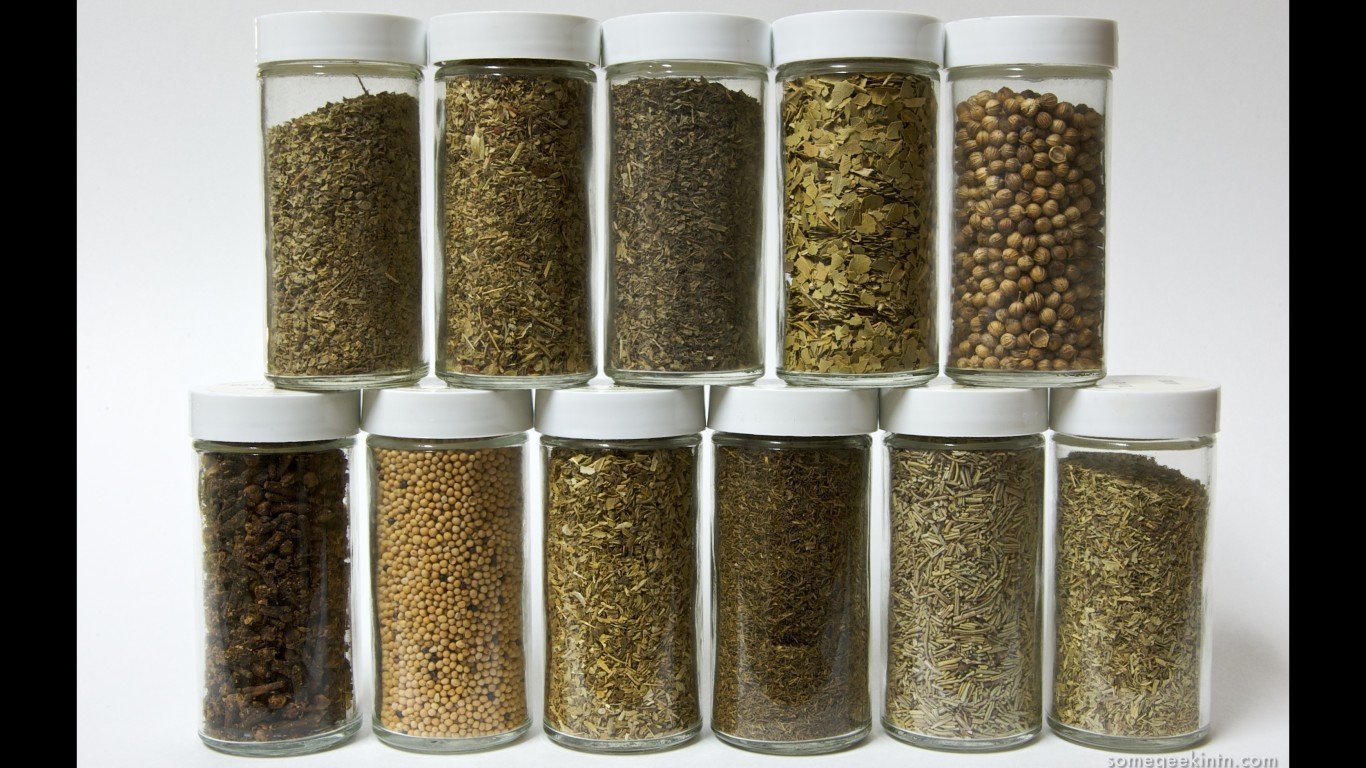

Foods of various kinds are or were living things, or were made from them, and like any living things, they are subject to decay. Some things go from fresh and healthy to spoiled faster than we might think — especially now that the weather is getting warmer and, in some parts of the country at least, growing more humid as well.
When we say that foods “spoil,” we’re talking about several different things. Some develop mold or mildew. Both are kinds of fungus. Mildew is usually light in color and grows on the surface of food, while mold is typically black or green and present underneath the surface.
Some are affected by bacterial growth, becoming toxic and in some cases life-threatening if consumed. Some undergo enzymatic changes through oxidation, developing undesirable flavors and aromas. Some just get soggy or dried out, and thus unpleasant (or impossible) to use. Still others remain edible but lose their nutritional value and/or flavor.
A number of factors cause food to spoil, but the main culprits are moisture and exposure to air. Moisture provides a medium for the growth of bacteria and fungi, and fosters undesirable chemical reactions between components of a food. A lack of moisture can also be a problem, though, causing items to crack or crumble as they dry out.
Most bacteria and fungi are aerobic, meaning that they require oxygen to grow, and oxidizing enzymes cause food to turn brown. Extreme temperatures, high or low, and (for certain foods) light can contribute to food spoilage, too.
Most of the items listed here are raw materials. Bear in mind that cooked food spoils fast, too, sometimes more quickly than its individual ingredients. The Mayo Clinic advises that leftovers of any kind should not be kept for longer than three or four days in the refrigerator. If they’re not consumed within that period, they should be discarded or, if appropriate, frozen for future use. Uncooked foods, like sandwiches and salads, should be eaten as quickly as possible. To be on the safe side, you should know which foods should and should not be kept in the fridge.
Click here for 20 foods that spoil faster than you’d think.

Bananas
Bananas can turn from green-accented yellow to brown-speckled yellow in two or three days. If you keep unripe bananas near fully ripened ones, they’ll ripen fast themselves because the ripe fruit gives off a gas called ethylene, which hastens the ripening process. Many sources warn against refrigerating bananas, and their skins will generally turn brown faster when subjected to cold, though the fruit inside may not be affected. Bananas that are refrigerated, however, might take longer to ripen, or not ripen at all, when brought back to room temperature. Note that bananas whose flesh has become very soft and brown are still perfectly edible: They may not work in the usual peel-and-eat way, but are good in desserts, banana bread, cocktails, etc.
[in-text-ad]

Berries
The problem with berries — especially soft-skinned raspberries — is that they’re very susceptible to mold and mildew. Refrigerating them in unopened plastic containers (or with their paper baskets tightly sealed with plastic wrap) will usually keep them edible for about a week. Rinse them only just before eating to avoid increasing mold-generating moisture. Once mold starts to form on a few berries, it’s safest to discard them all, as it spreads fast and can be hard to see.

Bread
Unless it’s the supermarket variety that’s loaded with preservatives, bread is extremely perishable. Mold spores form quickly on it, especially once it’s been cut into, and particularly in humid climates. Most kinds of bread mold are not dangerous, but because invisible mold cells can permeate the loaf, and because some mold can produce harmful mycotoxins, the USDA advises tossing the entire thing if it develops blue- or green-and-white splotches. While it isn’t considered spoilage, strictly speaking, the other problem with bread (the kind not loaded with preservatives), of course, is that its crumb hardens and dries out progressively and it becomes stale. At this stage, it is best cut into croutons or turned into breadcrumbs.

Brown rice
As long as it doesn’t get damp and isn’t invaded by weevils or rice mites (those tiny but mobile black specks that can find their way into grains kept in unsealed containers), white rice will last almost indefinitely. Brown rice, however, can go rancid in six to eight months, or slightly longer if refrigerated. That’s hardly overnight, but faster than most people would suspect. This is because the bran, which is polished off white rice but coats the brown variety, contains oils that start to spoil with time. Leftover cooked brown rice, even when refrigerated in a sealed container, should be eaten within five days or discarded.
[in-text-ad-2]

Corn on the cob
As with most fruits and vegetables, corn on the cob is susceptible to mold and mildew. They usually start at the pointed tip of the cob, and if that is cut off, the corn is still fine to eat. If the mold extends below the tip, the whole cob should be discarded. Unshucked corn will last for four to six days if refrigerated in sealed plastic bags. But there’s another problem with corn. It’s not exactly spoilage, but when sweet corn is first picked, it’s high in sugar and low in starch, and the balance starts reversing almost as soon as it’s off the stalk. Grocery store corn may have been picked weeks before it’s sold, so it can be starchy and nowhere near as sweet as expected. Farmers’ market corn is a better bet — but no matter where corn is purchased, it should be eaten as soon as possible for maximum flavor and good texture.

Dried herbs and spices
Almost every kitchen has a spice rack or shelf full of dried herbs and spices — sometimes purchased for a single recipe and never used again. These will rarely spoil in any common sense of the word, but they do lose their potency — which is to say their flavor and aroma — over time. This is especially true of softer herbs like chives, basil, and cilantro. Experts recommend that dried herbs, especially these latter varieties, should be replaced every year or so, and that spices and woody herbs like rosemary or oregano should be swapped out every three years.
[in-text-ad]

Fresh herbs
When many people buy fresh herbs at the grocery store or farmers’ market, they treat them like salad greens, stashing them in the crisper drawer — where they often turn limp and soggy, or (depending on the variety) dry out within a few days. The experts say to treat fresh herbs like flowers: Make sure the leaves are as dry as possible, then snip off the root ends and put them into a cup or jar of water, as if they were roses or tulips, and stick them into the refrigerator. (Basil does better at room temperature.) Most herbs, treated this way, will last for as long as a couple of weeks — though they do lose some flavor and aroma, so it’s best to use them as quickly as possible.

Ground meat
Ground meat goes bad much more quickly than steaks and chops, because grinding forms tiny air pockets throughout the meat in which bacteria, which may have been on the meat’s surface, can breed in moisture and darkness. Ground meat should be either cooked or frozen within a day of purchase — no matter what the sell-by date says. If the meat smells funny, has a slimy surface, and/or is starting to turn from its normal reddish or pinkish hue to gray, it’s bad. Bacteria can also develop in frozen ground meat if it’s thawed incorrectly. It should be transferred to the refrigerator for 24 hours before cooking or sealed in a baggy and placed in a bowl of cold — not warm — water for one to two hours until it softens.

Hard-boiled eggs
Fresh raw eggs will last at least a month unrefrigerated — though some say they start to lose flavor after a couple of weeks — and longer if they’re refrigerated in their original cartons. (Don’t wash eggs before storing them, as a natural bloom on their surface helps seal their porous shells against bacteria and oxygen.) These rules don’t apply to hard-boiled eggs, whether peeled or still in their shell. These will last a week at the most in the refrigerator, but if they’re left out at room temperature for more than a couple of hours, they should be discarded. This goes for deviled eggs, too.
[in-text-ad-2]

Iced tea
Stored in airtight containers, away from excessive heat (and the sink), tea leaves should last for as long as two years without beginning to spoil — and without losing flavor. Iced tea is another matter. Though there’s some controversy around this question, the Centers for Disease Control and Prevention (CDC) recommends that iced tea should be kept for no more than eight hours, even in the refrigerator. It also notes that raw tea leaves may be contaminated with bacteria, and if the tea isn’t brewed at the proper temperature to begin with (the CDC recommends 195º for three to five minutes), these may survive into the finished product. In addition, improperly cleaned vessels may contaminate the tea — with the risk being higher for so-called sun tea because the process gives bacteria more time to develop.

Kale
As in so many cases, moisture is the potential villain here. This popular vegetable, which is one of the most contaminated foods on the market, will last about a week if it’s stored in the refrigerator in a sealed plastic bag with a couple of sheets of paper towel to absorb excess dampness. Don’t wash kale until you’re ready to eat it, even if you think you’re drying it thoroughly, as this may cause the leaves to wilt, or encourage mold to form.
[in-text-ad]

Limes
Fresh limes last for two to four weeks at room temperature and up to two months in the refrigerator. The problem is that it’s hard to tell how old limes are already by the time they reach the grocery store, so fruit that is kept for more than a week should be monitored. Limes develop mold less often than lemons or oranges, but “spoil” by turning brownish and hard, with their juice virtually drying up. Cut limes should be used immediately unless they’re refrigerated, in which case they’re good for a couple of days.

Mayonnaise-dressed salads
Veteran picnickers know that potato salad and other mayonnaise-dressed dishes can be among the most dangerous things to eat at an outdoor meal, because eggs are a fertile medium for the development of bacteria. In any dish containing mayonnaise, the mayo will almost certainly spoil before any other ingredients. The safest procedure is to keep mayonnaise-dressed foods refrigerated until mealtime, then return uneaten portions to the refrigerator immediately afterwards, keeping them for no more than three days.

Mushrooms
Anyone who has ever cooked mushrooms knows that they give off a lot of liquid when they’re heated. Their high moisture content invites mold and mildew to form. Wild varieties like morels, black trumpets, and chanterelles may be particularly susceptible. Ideally, mushrooms of any kind should be eaten as soon as possible, though they may be stored in paper bags, in the refrigerator, or in a cool, dark place, for about a week. Packaged pre-sliced mushrooms may go bad a few days sooner.
[in-text-ad-2]

Pine nuts
While most varieties of nuts will last for six to nine months in the pantry and up to a year in the refrigerator, pine nuts — which are actually the seeds of certain kinds of pine trees — have a high oil content and tend to turn rancid after a couple of months at room temperature and three or four months refrigerated.

Olive oil
If it’s stored in a cool, dark place (like a cupboard away from the stove), olive oil — whether extra-virgin or otherwise — will generally last for two to three years. However, it is most flavorful within a year of pressing, and there’s often no production date on the bottle or can, so it’s hard to tell how old it is when it’s purchased. Make sure that olive oil is not only stored properly but tightly sealed, as it can turn rancid, developing what is sometimes described as a “winey” smell. Flavored olive oils may spoil more quickly, and are best stored in the refrigerator.
[in-text-ad]

Raw chicken
Raw chicken is notorious for being contaminated frequently with Campylobacter, Salmonella, or other bacteria. For that reason, it should always be cooked or frozen within a couple of days of purchase. (Frozen, it can last up to a year.) If it has a slimy surface or smells sour or just plain stinky, it should be tossed. Even unspoiled chicken should be handled very carefully. According to the CDC, make sure leaking juices from the package don’t touch other food; wash hands in warm soapy water for 20 seconds before and after handling raw chicken; use a separate cutting board for it; don’t wash it (or bacteria will contaminate the sink and other parts of the kitchen); cook it to an internal temperature of at least 165º; and refrigerate or freeze leftovers within two hours.

Raw seafood
The healthy fats and oils that make many kinds of fish and shellfish so good for us also begin to turn uncooked examples rancid within a couple of days. In addition, fish often contain bacteria of kinds that have adapted to colder temperatures — so-called SSOs, or specific spoilage organisms — so refrigeration doesn’t help as much as it does with other foods. These organisms are also what produce the strong, unpleasant “fishy” odor some seafood develops. Fortunately, most types of seafood freeze well, so if it isn’t to be eaten immediately, seal it in plastic bags and stick it in the freezer. Alternately, its refrigerated life can be extended for a few days by storing it in a container filled with ice, pouring off the melted water and replenishing the ice daily.

Sliced turkey
Most deli meats are processed with nitrates, nitrites, and other preservatives, and will last for a week or ten days if refrigerated. Unprocessed meats, especially store-roasted sliced turkey, should be consumed within four or five days, even if well wrapped. If the surface of the meat begins to grow slimy and the turkey has a pronounced odor, it should go into the trash. So you don’t have to throw out even more food, know which products to keep in the fridge and which at room temperature.
Essential Tips for Investing: Sponsored
A financial advisor can help you understand the advantages and disadvantages of investment properties. Finding a qualified financial advisor doesn’t have to be hard. SmartAsset’s free tool matches you with up to three financial advisors who serve your area, and you can interview your advisor matches at no cost to decide which one is right for you. If you’re ready to find an advisor who can help you achieve your financial goals, get started now.
Investing in real estate can diversify your portfolio. But expanding your horizons may add additional costs. If you’re an investor looking to minimize expenses, consider checking out online brokerages. They often offer low investment fees, helping you maximize your profit.
Thank you for reading! Have some feedback for us?
Contact the 24/7 Wall St. editorial team.
 24/7 Wall St.
24/7 Wall St. 24/7 Wall St.
24/7 Wall St.
